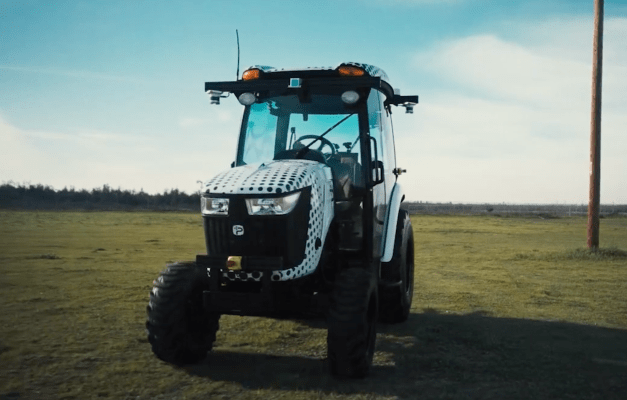“Robots suck.”
It’s a bold declaration for a startup founder aiming to work with robots — or more accurately, the software that helps turn a tractor, tiller or forklift into an automated vehicle. But Stefan Seltz-Axmacher, who previously founded and led the now shuttered autonomous vehicle startup Starsky Robotics, is trying to make a point.
“They’re really difficult, they break all the time and getting to a stable product is really hard,” Seltz-Axmacher said in a recent interview. “Everyone kind of ends up building nearly everything from scratch, for nearly every application.”
To make matters more complex, robots used in warehouses, mining, agriculture and other industrial environments have hyper-specific applications that are structured and are often repeated thousands of times. In other words, the farmer in Iowa, the yard truck operator in Florida and the e-commerce giant with 100 warehouses spread throughout the country have specific needs that no one else does.
That’s where Seltz-Axmacher, co-founder Ilia Baranov and their new startup Polymath Robotics hope to come in. The pair have developed a plug-and-play software platform and an accompanying SDK that allows companies to quickly and cost efficiently automate industrial vehicles. Think of it as SaaS for industrial robotics.
Polymath Robotics, which came out of stealth Friday and is a Y Combinator Summer 2022 cohort, aims to become the Oracle of the robotics world. The startup is building basic generalizable autonomy designed to automate the 50 million or so industrial vehicles that are operating in closed environments today.
The San Francisco-based startup’s software is hardware and business model agnostic and focuses on all the features a company might need to run their automated robot, tractor, or forklift, including path planning, hazard detection, behavior trees, human detection, controls tuning and safety.
Polymath, under the lead of Baranov (who is CTO and previously led robotics teams at Clearpath Robotics and Amazon Lab 126) also created, and now released, a free tool called Caladan that lets users build on top of the company’s software in simulation. And unlike other sims, this can be viewed and created on an internet browser and doesn’t require the installation of other tools like ROS, Gazebo or even Linux, according to the company.
The Polymath Robotics software platform lets another startup, warehouse owner, farmer or mining company skip the often long process of building out autonomy, a safety layer and front-end app. Seltz-Axmacher said the software lets these users just focus on the app, connect to its REST API and command a virtual tractor, forklift or other kind of robot in sim.
Polymath is already driving unmanned and working with potential customers. But technical teams interested in seeing how it works can start building for free in simulation via its API.
Polymath’s API tells the robot what to do, whether it’s in the simulation tool or in the real world. For instance, this TechCrunch reporter was able to control a tractor located in a dusty lot in Modesto, California via an internet browser while sitting at her desk in Arizona.
Of course, software alone cannot turn a tractor into an automated vehicle that operates without a human. Polymath has partnered with Idaho-based startup Sygnal Technologies to help on the hardware side of things by providing retrofits with their drive-by-wire kits.
Sygnal’s CEO and co-founder Josh Hartung knows a thing or two about automated vehicles and drive-by-wire systems. His previous startup PolySync, which has since shutdown, developed an automated vehicle software platform as well as a drive-by-wire kit that numerous other startups used in their own AV demos.
This time around, Hartung and his co-founder Trey German developed a drive-by-wire kit designed with redundant controls for the accelerator, brake and steering and proprietary switching technology. And it’s built with fleets and commercial deployments — not demos — in mind. After years of experiencing the hype around AVs and seeing numerous startups, including his own, get caught up in a cycle of demos and proof of concepts in order to get funding, Hartung believes the industry is finally shifting towards reality.
“I believe the next stage of autonomy is actually returning to business principles, Hartung said, adding that Polymath seems well aligned with this shift.
It seems a number of angel investors have already taken notice of the 10-person team at Polymath.
While Seltz-Axmacher isn’t ready to share exactly what the company has raised, he did list some of the company’s angel investors, all of whom have backgrounds in autonomous vehicle technology, software and robotics. The group includes Catapult Ventures managing director Darren Liccardo, Thursday Ventures general partner Matt Sweeney, Cruise co-founder and CEO Kyle Vogt and Oliver Cameron, the former co-founder and CEO of Voyage who is now at Cruise, according to Seltz-Axmacher.
“What we’re hoping is to make robotics look a lot more like SaaS in terms of how quick you can get in and out,” he added.
Sweeney, who formerly worked at Neuralink and was product and engineering lead at Uber before launching Thursday Ventures, believes the startup has the right product, at the right time.
“What’s appealing about this approach is that I can see a future of an Oracle-like company of robotics,” Sweeney said. “All sorts of business come to Oracle for hardware and software solutions for their business, and with minor configurations can plug it into their business. If you project forward 10 to 15 years where can this end up its an enormously audacious goal, but I think it can also continue to provide value all along the way.”

